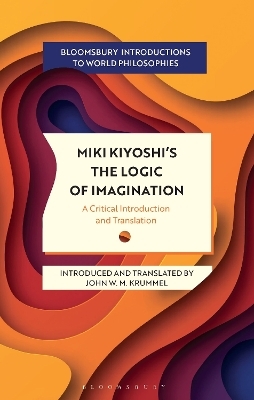
Miki Kiyoshi's The Logic of Imagination
A Critical Introduction and Translation
Seiten
2024
Bloomsbury Academic (Verlag)
978-1-350-44990-9 (ISBN)
Bloomsbury Academic (Verlag)
978-1-350-44990-9 (ISBN)
The Japanese philosopher Miki Kiyoshi opens doors to all those interested in rethinking the problem of imagination, myth, and technology.
Miki Kiyoshi is one of the central figures in the Kyoto School, often spoken of as the heir of Kitaro Nishida. Born in Japan in 1897, he died in prison shortly after the end of World War II in 1945 at the age of 48.
Miki's The Logic of Imagination first appeared in the journal Thought in 1937 under the themes of “Myth,” “Institution,” and “Technology”. The next part, “Experience,” was serialized in the same journal and Miki continued to work on the final part, but was never completed it due to his arrest.
This translation makes this seminal work available in English for the first time. Featuring an introduction and accompanied throughout by contextual notes, it includes essential information about Miki's life and work. Miki’s philosophy of the imagination anticipated later theories found first in Hannah Arendt, and then in Paul Ricoeur and most recently in Charles Taylor. The connection Miki makes of the imagination with technology anticipates ideas of the technological imagination in Don Ihde and Bernard Stiegler.
Miki's thinking about the imagination illuminates our understanding of technology and how we behave in the world. This accessible, critical edition of his work does justice to one of the most unfairly underrated authors of Japanese philosophy.
Miki Kiyoshi is one of the central figures in the Kyoto School, often spoken of as the heir of Kitaro Nishida. Born in Japan in 1897, he died in prison shortly after the end of World War II in 1945 at the age of 48.
Miki's The Logic of Imagination first appeared in the journal Thought in 1937 under the themes of “Myth,” “Institution,” and “Technology”. The next part, “Experience,” was serialized in the same journal and Miki continued to work on the final part, but was never completed it due to his arrest.
This translation makes this seminal work available in English for the first time. Featuring an introduction and accompanied throughout by contextual notes, it includes essential information about Miki's life and work. Miki’s philosophy of the imagination anticipated later theories found first in Hannah Arendt, and then in Paul Ricoeur and most recently in Charles Taylor. The connection Miki makes of the imagination with technology anticipates ideas of the technological imagination in Don Ihde and Bernard Stiegler.
Miki's thinking about the imagination illuminates our understanding of technology and how we behave in the world. This accessible, critical edition of his work does justice to one of the most unfairly underrated authors of Japanese philosophy.
Kiyoshi Miki (1897-1945) was a key member of the Kyoto School. He was a literary critic, scholar and university professor of philosophy. John W.M. Krummel is Associate Professor and Chair of Religious Studies at Hobart & William Smith Colleges, USA.
Translator’s Introduction
Introduction
Chapter 1: Myth
Chapter 2: Institution
Chapter 3: Technology
Chapter 4: Experience
Index
| Erscheinungsdatum | 28.07.2024 |
|---|---|
| Reihe/Serie | Bloomsbury Introductions to World Philosophies |
| Übersetzer | Dr John W. M. Krummel |
| Verlagsort | London |
| Sprache | englisch |
| Maße | 156 x 234 mm |
| Themenwelt | Geisteswissenschaften ► Philosophie ► Östliche Philosophie |
| Geisteswissenschaften ► Philosophie ► Philosophie der Neuzeit | |
| ISBN-10 | 1-350-44990-3 / 1350449903 |
| ISBN-13 | 978-1-350-44990-9 / 9781350449909 |
| Zustand | Neuware |
| Informationen gemäß Produktsicherheitsverordnung (GPSR) | |
| Haben Sie eine Frage zum Produkt? |
Mehr entdecken
aus dem Bereich
aus dem Bereich


